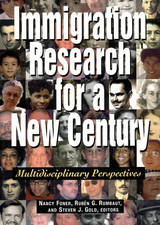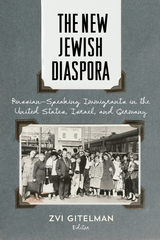2 books about Gold, Steven J.

Immigration Research for a New Century
Multidisciplinary Perspectives
Nancy Foner
Russell Sage Foundation, 2000
The rapid rise in immigration over the past few decades has transformed the American social landscape, while the need to understand its impact on society has led to a burgeoning research literature. Predominantly non-European and of varied cultural, social, and economic backgrounds, the new immigrants present analytic challenges that cannot be wholly met by traditional immigration studies. Immigration Research for a New Century demonstrates how sociology, anthropology, history, political science, economics, and other disciplines intersect to answer questions about today's immigrants. In Part I, leading scholars examine the emergence of an interdisciplinary body of work that incorporates such topics as the social construction of race, the importance of ethnic self-help and economic niches, the influence of migrant-homeland ties, and the types of solidarity and conflict found among migrant populations. The authors also explore the social and national origins of immigration scholars themselves, many of whom came of age in an era of civil rights and ethnic reaffirmation, and may also be immigrants or children of immigrants. Together these essays demonstrate how social change, new patterns of immigration, and the scholars' personal backgrounds have altered the scope and emphases of the research literature, allowing scholars to ask new questions and to see old problems in new ways. Part II contains the work of a new generation of immigrant scholars, reflecting the scope of a field bolstered by different disciplinary styles. These essays explore the complex variety of the immigrant experience, ranging from itinerant farmworkers to Silicon Valley engineers. The demands of the American labor force, ethnic, racial, and gender stereotyping, and state regulation are all shown to play important roles in the economic adaptation of immigrants.The ways in which immigrants participate politically, their relationships among themselves, their attitudes toward naturalization and citizenship, and their own sense of cultural identity are also addressed. Immigration Research for a New Century examines the complex effects that immigration has had not only on American society but on scholarship itself, and offers the fresh insights of a new generation of immigration researchers.
[more]

The New Jewish Diaspora
Russian-Speaking Immigrants in the United States, Israel, and Germany
Gitelman, Zvi
Rutgers University Press, 2016
In 1900 over five million Jews lived in the Russian empire; today, there are four times as many Russian-speaking Jews residing outside the former Soviet Union than there are in that region. The New Jewish Diaspora is the first English-language study of the Russian-speaking Jewish diaspora. This migration has made deep marks on the social, cultural, and political terrain of many countries, in particular the United States, Israel, and Germany. The contributors examine the varied ways these immigrants have adapted to new environments, while identifying the common cultural bonds that continue to unite them.
Assembling an international array of experts on the Soviet and post-Soviet Jewish diaspora, the book makes room for a wide range of scholarly approaches, allowing readers to appreciate the significance of this migration from many different angles. Some chapters offer data-driven analyses that seek to quantify the impact Russian-speaking Jewish populations are making in their adoptive countries and their adaptations there. Others take a more ethnographic approach, using interviews and observations to determine how these immigrants integrate their old traditions and affiliations into their new identities. Further chapters examine how, despite the oceans separating them, members of this diaspora form imagined communities within cyberspace and through literature, enabling them to keep their shared culture alive.
Above all, the scholars in The New Jewish Diaspora place the migration of Russian-speaking Jews in its historical and social contexts, showing where it fits within the larger historic saga of the Jewish diaspora, exploring its dynamic engagement with the contemporary world, and pointing to future paths these immigrants and their descendants might follow.
[more]
READERS
Browse our collection.
PUBLISHERS
See BiblioVault's publisher services.
STUDENT SERVICES
Files for college accessibility offices.
UChicago Accessibility Resources
home | accessibility | search | about | contact us
BiblioVault ® 2001 - 2024
The University of Chicago Press









